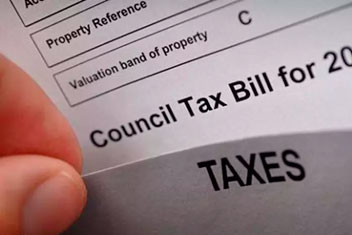RISING COUNCIL TAX BILLS AND BANKRUPTCY CASES ARE ISSUES FOR 2018
Rising council tax bills and the use of bankruptcy against council taxpayers who are victims of mistaken assessments are among the major issues and concerns arising in local taxation at the start of 2018.
Following an official announcement before Christmas 2017, council tax bills are set to rise by an average of £100 in 2018 after the Government bowed to calls to relieve pressure on social care services by removing the automatic 2% cap placed on council tax rises. Bills may rise by up to 3% which will take the average Band D property demand from £1,591 to £1,686. This will take effect as an additional 3% social care precept which will appear on bills, with additional sums (estimated at around £12 per household) likely to be added towards increasing policing costs. Relevant amounts for the year will be set by local councils from 1 February, with the first bills going out to taxpayers in March and early April 2018.
At the same time default levels for non-payment remain high in respect of previous financial years. Many local authorities are taking an increasing harsh line on debtors. This is reported from a number of areas, particularly with anyone owning more than one dwelling or involved with the commercial letting or managing property on a small-to-middle scale.
The levying of empty property premiums, the serving of multiple bills on what should be single-bill properties and refusals by councils to award discounts and reliefs are increasingly common. And of increasing concern is the casual way councils are resorting to the severest sanctions against debtors, including bankruptcy and charging orders.
This harder line on enforcement, apparent from 2016, involves instigating bankruptcy proceedings under an obscure provision in the enforcement regulations (Reg. 49 of the Council Tax (Administration & Enforcement) Regulations 1992). In this regard, property owners with equity provide a too-tempting target as they have property and assets that can be realised. In many cases the action is wholly disproportionate and all too often fraught with errors that the taxpayers struggle to correct once the process begins. Bankruptcy procedures are lengthy, complex and, unfortunately as is emerging, can be instigated by mistake or negligence.
The commencement of proceedings swiftly results in the level of alleged debt spiralling with the addition of fees charged by solicitors and insolvency practitioners soon exceeding the original alleged tax liability. When this stage is reached proceedings all too often turn into an exercise aimed at recovering fees rather than the settlement of the actual tax liability (if any is outstanding).
The damaging effects of the unrestricted use of bankruptcy proceedings by billing authorities and the severe personal impact it has on taxpayers is an issue of growing public concern. The topic currently being examined by the BBC current affairs show, Inside Out, with the first of a series being aired on the London edition of the programme (Monday, 15 January 2018 – BBC1 London 7.30 pm).
CTLS TAKES ON COUNCIL TAX BANKRUPTCY CASES
Over autumn and winter 2017-2018 CTLS has been active in advising and assisting an increasing number of taxpayers being wrongly subject to bankruptcy proceedings for council tax brought by local councils.
A number Councils are using bankruptcy proceedings against taxpayers in a heavy-handed fashion, knowing that there is little chance of taxpayers obtaining specialist advice and assistance needed. Bankruptcy proceedings are specialised and technical and mixing them with the already complex field of local taxation is often a recipe for error.
A good example of this was a case one London authority took to the High Court in summer 2017 against the owner of two properties which had been rented out for many years. All the council tax had been but this did not stop the process. With support from CTLS the taxpayer succeeded in showing that an alleged liability of over £12,000 did not exist, and arose from computer errors. Following the involvement of CTLS, both the council tax claimed and the substantial legal costs demanded by insolvency practitioners against the taxpayer were successfully challenged and dismissed by the High Court, the Council finally accepting the claim had been wholly without merit.
Concerns over such mistakes were expressed by Registrar Simmonds as much ten years ago in London Borough of Lambeth v Simon [2007] BIPR 1629 June 6 2007 at paragraph 45:
“I am constrained to record that I (and my brother registrars) have been for some time and remain concerned by the particulars of debt relied upon in petitions by some local authorities. This case only heightens this concern. There are cases where pleaded liability orders are shown not to exist. In other cases they cannot be proved by the production of a sealed order or a statement from the clerk to the magistrates that an order has been made. No credit for payments are shown, thus the integrity of the debt upon which some local authorities’ petitions are based is in question.
Ten years on this observation is more valid than ever. Following the case of Okon v Lewisham London Borough Council [2016]EWHC 864 there are the signs that some in the higher courts are beginning to appreciate the difficulties and complexities of mixing insolvency law and council tax and that the magistrates’ court and the county court are often failing to exercise discretion correctly and fail to appreciate the technicalities in determining liability, strict proof and routes of appeal. But even the Court of Appeal has failed to appreciate the difficulties that can afflict taxpayers in this area, as show in the latest decision in Yang v Official Receiver [2017]EWCA 1465 on insolvency costs and remedies.

QUICK LINKS

